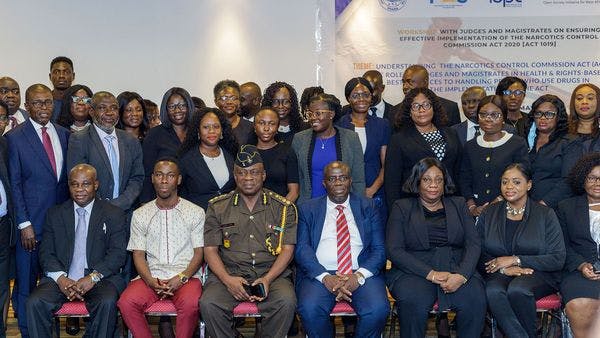POS Foundation
Engaging judges to implement the new drug law in Ghana
By Maria-Goretti Ane & Doris Bangfu
From the 18th to the 27th May 2022, the POS Foundation, the International Drug Policy Consortium (IDPC) and the Judicial Training Institute (JTI) organised a series of workshops as part of efforts to sensitise critical stakeholders – particularly the judges of the Lower and Higher Courts – on their role in the enforcement of Ghana’s new Narcotics Control Commission Act 2020 (Act 1019), especially concerning people who use drugs.
The workshops were funded by the Open Society Initiative for West Africa (OSIWA), and brought together over 40 judges and magistrates at each training session in the Southern Zone (Accra, Hohoe, Takoradi, Ho and Koforidua) and the Northern Zone (Ashanti Region and its environs). It follows-on from similar engagements in Ghana with law enforcement personnel and with local farmers of crops deemed illicit, as well as workshops with judges that IDPC routinely delivers in France and in various other settings.
Ghana’s new Act was passed on March 20th 2020, and was assented to by the President on May 11th 2020. It seeks to treat drug use and dependence as a public health issue, with a focus on treatment and rehabilitation rather than the criminalisation and incarceration of people for minor drug offences. In the new law, drug use is punishable with a fine of between GH₵2,400 to GH₵6,000, rather than a prison sentence as before. Although this falls short of IDPC’s ‘Gold Standard’ of drug decriminalisation, it nonetheless represents an important example of incremental, progressive drug policy reforms in Africa.
Speaking at the opening ceremony, Professor Sir Dennis Adjei – a Justice of the Court of Appeal, and Director of the Judicial Training Institute – stated that Ghana’s new drug law is intended to address the inherent problems of the previous policies which did not take into account the interests or needs of people who use drugs. He further lamented the way that some judges had been interpreting the old drug law when it came to drug possession and use. He applauded stakeholders for the steps taken to date in advocating for change, reviewing the drug law, and bringing more clarity to the issues.
The Executive Director of the POS Foundation, Jonathan Osei Owusu, indicated that the new law now allows judges to divert people who use drugs into health services such as harm reduction, treatment and rehabilitation – thereby providing essential alternatives to incarceration and criminalisation, as is permitted within the international drug control conventions. He further indicated that the implementation of the new law in Ghana is a very critical step, and it is therefore essential that stakeholders, particularly judges of the trial courts, know their role in its delivery – while also consulting them on the best practices in the implementation process, including the provision of harm reduction to people who use drugs.
Maria-Goretti Ane from IDPC-Africa also added her voice on the critical role that judges will play in the implementation of the new law. She called on the participants to consider using their discretionary powers more effectively, especially when it comes to people who use drugs. For example, when opting to impose fines, the economic status of the individual should be considered so as not to impose disproportionate penalties (for which non-payment can result in imprisonment, which would defeat the purpose of the new drug law entirely).
Ghana’s Director-General of Prisons, Isaac Egyir, provided a speech in his absence and commended how the new Act has made provisions for alternatives to imprisonment. However, he noted that the prisons still receive persons convicted and sentenced for drug use alone: such individuals constitute over 4 percent of the entire prison population in the major prison of Ghana – Nsawam. He called on the judges to ensure that, from now, people who use drugs are diverted from prison as much as possible.
Participants of the training were grateful for the opportunity and the role civil society is playing in ensuring judges in Ghana are sensitized about national, regional and global drug policy reform moves. They agreed that it's important that judges are kept abreast of latest developments and discussions, especially with the Legislative Instrument that will support implementation of the new Act currently awaiting approval from Parliament and the Attorney-General.
During the training workshop, the judges and magistrates noticed a few ambiguities within the text of the new law, especially on the interpretation of ‘drug possession for personal use’ (which the law defines as “possession or control of a quantity of narcotic drugs or plant which does not exceed the quantity which can reasonably be used by an individual in a day”). Many participants saw this as creating a lot of ambiguity and being open to discretion, which could result in inconsistencies, abuse or corruption. The deliberations also allowed participants to consider which threshold quantities of drugs could be used, and how these can be included in the guidelines for the courts and law enforcement. Crucially, there was widespread agreement on the need to further engage with people who use drugs on this, and to call for further amendments to the law to treat drug use purely as an administrative offence (as is already being contemplated by the key institutions in the country).
The participating judges proposed that further sensitization is needed, and the most sustainable way to ensure this would be to include a special focus on drug policy in the national judicial training programme.
Regions
Related Profiles
- International Drug Policy Consortium (IDPC)
- Maria-Goretti Ane
